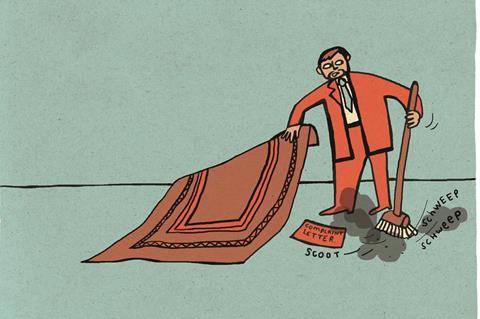A recent case raises the question, how long must a letter of complaint stay unanswered before a dispute is inferred?

Main contractor Beck Interiors wrote to its subcontractor on 5 April. It complained that UK Flooring Contractors had not done too well in fulfilling its contract for laying 55m2 of carpet. Beck’s delay claim was for £160,000 plus. By 10 April, Beck had heard only silence from the flooring folk, so it issued a notice of adjudication saying it was now in dispute.
The silence, says Beck, is an inference. It infers a dispute. Snag is that between 5 and 10 April was the four-day Easter holiday.
Well, said Beck that still leaves one day to infer that the flooring firm disputes the claim.
The adjudicator bought that argument and pressed on with the adjudication. Mind you, another part of Beck’s complaint was also part of the adjudication and had been on the cards for much longer than one day; it had brought in a replacement carpet layer and sent the extra-over bill to UK Flooring. So the adjudicator was on more solid carpet with that part of the adjudication.
Eventually the adjudicator awarded Beck some of its delay claim and some of its replacement contractor claim. UK Flooring was unhappy with all this; it said one day’s notice was no time to draw breath on the £160k delay argument. It refused to honour the adjudicator’s decisions. Beck came to the High Court. It said that since it heard nothing in reply to its 5 April pre-Easter letter, albeit sent after close of business before Good Friday, it could draw the inference that UK Flooring had crystallised a dispute.
The judge plugged into the business of inferences. He said of the 5 April letter that it was “sent knowingly by Beck after close of business immediately before holiday weekend. Beck must by inference be taken to have known that UK Flooring would have no opportunity in working hours before the following Tuesday 10 April 2012, to consider it or have any realistic chance of producing any response”. Do you see how the business of inference is capable of all sorts of, well, inferences? He decided that it was wrong to begin the adjudication with a mere one day of silence indicating a dispute. It didn’t.
That doesn’t mean a dispute can’t form in a day, or in an instant for that matter. First, there is the Lie Direct. If the retort is “you lie” or “you are a liar”, hey ho, that’s a crystallised dispute. Then there is the Lie Circumstantial: “If anyone says such and such, he lies.”
Next there is the Countercheck Quarrelsome: “How dare you say such and such.” Then comes the Reproof Valient: “You know that is not true.” Less painful, but still enough for the dispute to arrive is: the Reply Churlish: “You are no judge; your opinion is worthless.” Then the Quip Modest: “I prefer it my way.” And finally is the Retort Courteous: “Sir, my opinion is otherwise.”
By 10 April, Beck had heard only silence from the flooring folk. Snag is that between 5 and 10 April was the four-day Easter holiday …
The Non-Reply Apathetic is also certainly a dispute, because of that word apathetic. It matures over time (more than one day), a reasonable time into that dispute. So, part of Beck’s award was good, the other part not, because it wasn’t a dispute yet.
In which case, the High Court had to ask whether it was legitimate for the court to sever the adjudicator’s decision. Can it carve out of the document that part of the decision that was generally in dispute before the notice of adjudication was dispatched?
The judge said yes. Fortunately, the adjudicator in this case produces neat, clear and easy to understand awards. He cast the document so that the claim for costs of completing the carpeting works was easily seen, and so too the new liquidated damages claim. The cost of completing the carpet contract was said by the adjudicator to be £19,763 and £33,000 for the liquidated damages. So out went the £33k. The £19,763 was enforced.
The court would not enforce the interest award because it related mostly to the delay damages. Not enforceable also was the adjudicator’s order that UK Flooring bear the cost of the adjudicator’s fee. The reason is that the court cannot second guess what the adjudicator would have done if he had decided to only deal with the laying of the carpet claim. Those of you with a practical bent might shout, “Ask him”, but all the lawyers would answer with the Reply Churlish or something like that.

Tony Bingham is a barrister and arbitrator at 3 Paper Buildings, Temple



























No comments yet